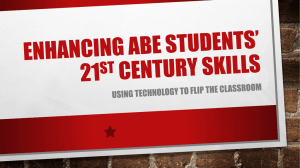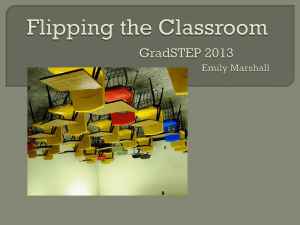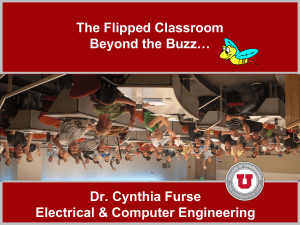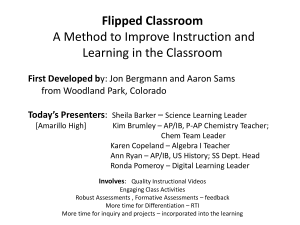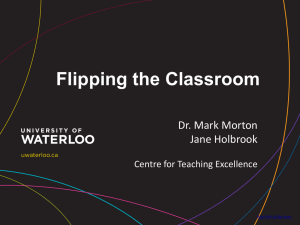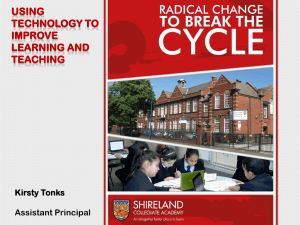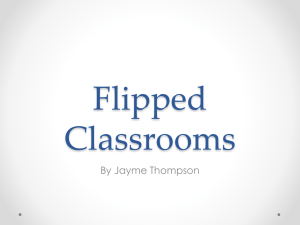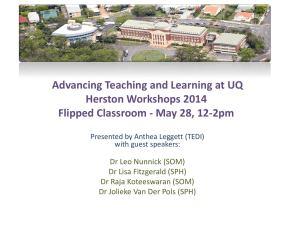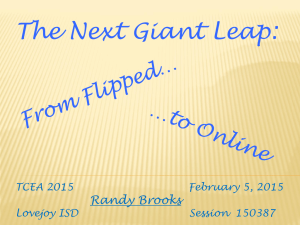PPTX - IACBE
advertisement
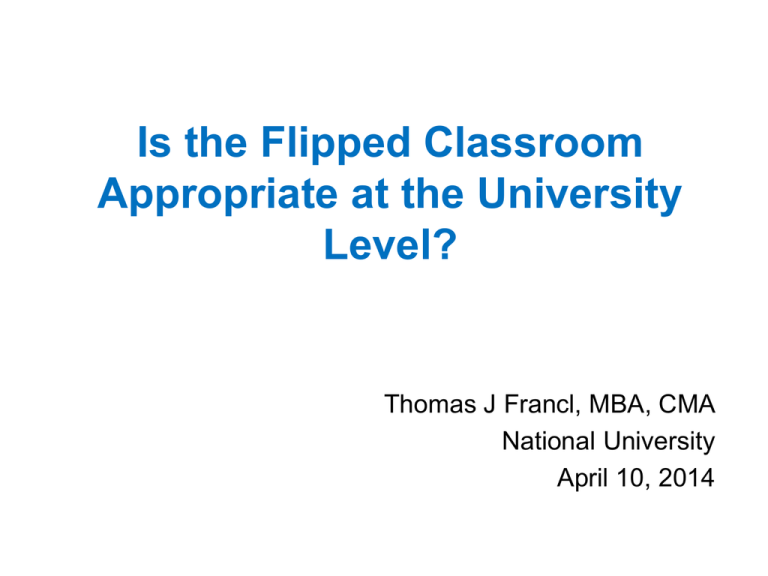
Is the Flipped Classroom Appropriate at the University Level? Thomas J Francl, MBA, CMA National University April 10, 2014 Presentation Objectives What is a flipped classroom? Why even talk about it? Who has flipped their classes? When should we do it? Where can we do it? How do we begin? The Traditional Classroom Lecture – Material presentation Q & A – Check for understanding Homework – Practice, practice, practice Projects – Research, presentation Q & A – Review Quiz – Test retention, understanding Short attention span 9 PM zone out Solutions? Stand up comedy Participation points Initial Venture into Flipping • The “Opportunity” – Staffing two, 2-week MBA introduction classes • Classes offered over 15 times a year • Staffing is a burden • Material, Presentation is boring Automate the delivery! Increase class sizes Reduce expenses & staffing headaches Flipped Learning Example of using avatars & scripted voices… ACC501 ACCOUNTING FUNDAMENTALS Introduction Module Objectives Review Course Outline – Download & print it! Describe Course Design 6 Flipped Learning Example of hiring a professional voice over… “Accounting” Definitions Definition – Process of identifying, measuring, and communicating economic information about an entity so that users of that information can make informed judgments and decisions. Financial Accounting – Preparation of financial statements for external users Management Accounting – Preparation of economic reports only for the entity’s internal personnel 8 Flipped Learning Fast forward one short year Ignored the staffing & cost cutting but spruced up the delivery Flipped 2.0: Two Management Accounting classes Focused on real student learning Flipped Learning Nationwide Initiatives: Started in a Colorado high school Initial adoptions in elementary & high school University experimentation Not a MOOC concept! Resources: FlippedLearning.org FlippedClassroom.org Flipped Learning Flipped Learning is a pedagogical approach in which direct instruction moves from the group learning space to the individual learning space, and the resulting group space is transformed into a dynamic, interactive learning environment where the educator guides students as they apply concepts and engage creatively in the subject matter. The Flipped Learning model deliberately shifts instruction to a learner-centered approach where class time is dedicated to exploring topics in greater depth and creating rich learning opportunities. Students are actively involved in knowledge construction as they participate in and evaluate their learning in a manner that is personally meaningful. 2014: Flipped Learning Network The Flipped Classroom Student Responsibilities: View video lecture – eCollege, private YouTube Take brief quiz – repeats OK, and, yes, they’re graded Draft the homework exercises Respond to Threaded Discussion Questions ON THEIR OWN TIME! The Flipped Classroom 2.0 Class Meetings: Open forum for student questions Break into separate chat rooms, classroom groups Students are to discuss homework solutions Can display printed results (maybe) Peer-on-peer learning is powerful Each group is presented with a discussion topic Debate a response, select a spokesperson Make presentation to entire class Best Threaded Discussion responses presented General Q & A Introduce next topic The Flipped Classroom 2.0 Videos: Short, maybe 5 to 10 minutes each Multiple videos per topic (chapter in book) Able to Pause, Replay as desired Can be publisher supplied Can be automated Power Points (aka Video) Better with instructor’s voice over (maybe) Viewed when the student is ready to learn Quizzes: Brief quiz, maybe one per video Purpose is to reinforce the material Open book Repeat until 100% They are graded, multiple choice questions The Flipped Classroom 2.0 Flipped Format Notes: The focus is placed on the LEARNING The instructor is just a FACILITATOR The RESPONSIBILITY for learning is the student’s The student ends up doing MORE WORK but loves it! The instructor is MORE INVOLVED in their thought process Classroom discussion is at least one level higher on the Bloom Taxonomy pyramid The Flipped Classroom 2.0 “Opportunities:” Course designer needs creativity, testing resources SPL can help with the technology Slide voice overs – dictate with Dragon Speaking then record & paste audio clips onto slide Adjuncts need to be trained On-site class length Grading – structure to evaluate learning progress & success Student feedback Professor Francl is a great teacher who truly cares for his students. It was great being in his class. I like how he had break out rooms for us to go in and work together on discussion for the class. The "flipped" learning was quite efficient. Forcing ourselves to learn and bring our questions to the chat sessions was a great format. Enjoyed and most useful. The format Prof. Francl is using is great. Instead of having to sit in the lectures and listen to him read slides, we actually ask questions and interact. It works very well. There are videos we watch to review the slides/chapter detail. Presentation Objectives What is a flipped classroom? Why even talk about it? Who has flipped their classes? When should we do it? Where can we do it? How do we begin? Let’s all Flip Out! Reference: www.jrit-nu.org Journal of Research in Innovative Teaching Resources: FlippedLearning.org FlippedClassroom.org My address: TFrancl@NU.edu

